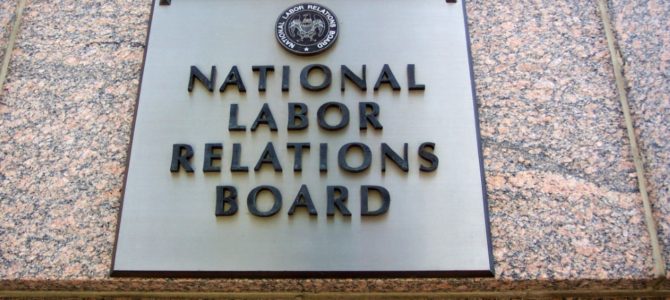
“No jokes allowed. Ever.” Apparently, this is the new Twitter rule, as The Federalist national news publication faces a joint administrative and judicial broadside at the National Labor Relations Board. What the publication is going through constitutes just one of the many costly, silly, and arguably unconstitutional quasi-judicial proceedings underway throughout the federal bureaucracy.
A recent case before the NLRB — in which the agency served as legislator, police, prosecutor, and judge — helps illustrate why not everything can, or should, be handled in-house at the executive branch. In June 2019, The Federalist publisher Ben Domenech tweeted, “FYI @FDRLST first one of you tries to unionize I swear I’ll send you back to the salt mine.”
His followers got the joke. His employees got the joke. But one Twitter user apparently did not get the joke, so he filed a complaint with the NLRB. The user does not even work for Domenech nor have any ties to The Federalist, but the NLRB didn’t mind. Political appointees for the NLRB investigated the claim and prosecuted Domenech for violating NLRB rules, all while presiding over the so-called hearing.
When The Federalist employees came to Domenech’s defense by testifying that they understood the tweet to be a joke and in no way felt threatened by Domenech, the administrative law judge rejected their testimony. He reasoned the testimony of the employees could not offer any value to the proceedings, and ultimately decided that Domenech violated NLRB rules.
Domenech has appealed the adverse decision to the only channel available: the NLRB. Just like the administrative law judge, that board refuses to hear from Federalist employees who can offer actual insight about working at The Federalist.
Although we learn this in middle-school civics class (if you’re fortunate enough to have had that vital education), too many people quickly forget the critical role our government structure plays in guaranteeing freedoms. If you can remember Schoolhouse Rock’s “I’m Just a Bill” but can’t quite remember the words to “Three Ring Government,” you are not alone. Members in all three branches of our federal government frequently “forget” them, too.
As James Madison captured in Federalist 51, our federal structure is designed to give unique powers to each branch of government for “keeping each other in their proper places” — the critical separation of powers principles. The Constitution contemplates that each branch of government will jealously guard its role, thus avoiding abuse of power and protecting individual liberty. Too often, as we find out in court, one of the political branches oversteps the bounds.
The big government rationale is clear: Our country is large, with a diverse range of issues that need government attention, so why not delegate more complex matters to executive agencies?
Rather than guard their constitutional duties and powers, our nation’s legislators and judges frequently delegate them to the 430 federal departments, agencies, and sub-agencies that make up the administrative state. As a practical matter, this gives federal agencies the power to make and judge law. It has led to calls from every corner to return to the lawful constitutional order.
There are hundreds of examples in which a government agency wears many hats. But The Federalist example goes beyond what we typically see and illustrates just how far an agency will go to regulate every aspect of American life. Imagine your business, expressing itself in social media, saddled with months of expensive and time-consuming administrative judicial proceedings based on complaints by non-employees. The precedent set here by the NLRB’s prosecution of The Federalist will open the floodgates.
Not only does the pattern of “investigate, prosecute, convict, and repeat” circumvent our constitutional demand for separation of powers, but it delegitimizes every decision an agency makes. There can be no such thing as a fair trial when one party calls the shots. How can Americans be expected to trust agencies with a majority of government responsibility, when agencies have all the power to act in their own interests?
The Framers warned against blurring the duties of the three branches for this very reason. Sick of the kangaroo courts in England, they intentionally made the judicial branch an independent body that would not answer to any one particular political group or idea. Unfortunately, the growth of the administrative state means we rely less on elected politicians and appointed judges confirmed by the Senate, and more on politically appointed, non-confirmed, and highly entrenched bureaucrats to monitor every aspect of our society.
Schoolhouse Rock sang about a “Three Ring Government.” Today, many would agree that at the rate the administrative state is expanding, our government increasingly resembles a three-ring circus.








